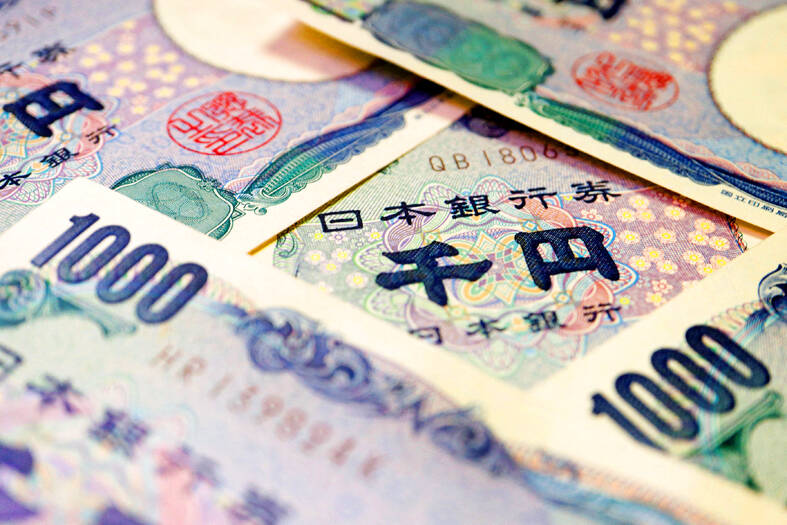Japan is open to intervening in the currency market “to mitigate the side effects of a weak yen,” a Japanese government panel member said, reflecting Japanese Prime Minister Sanae Takaichi’s concerns about inflation.
Takaichi’s administration “will intervene more actively in the foreign exchange market, I believe,” Takuji Aida, who is also chief economist at Credit Agricole SA, said yesterday during a live broadcast on NHK.
He added that the nation has more than enough foreign exchange reserves, as Japan’s economic situation is not dire.

Photo: Reuters
Aida’s comments echo remarks he made last week warning traders that currency intervention could come sooner than many expect. The threshold of 160 to the US dollar is seen as a line in the sand after authorities bought the yen on several occasions last year after it weakened past that level.
Aida on Thursday said that Japanese authorities could step into the market before the yen reaches that level, if currency moves “become sharp.”
After weakening last week to a 10-month low that took it past 157 to the US dollar, Japan’s currency drifted a tad higher to about 156.40 as of yesterday in Tokyo, just days after Takaichi unveiled the nation’s biggest fiscal stimulus package since the COVID-19 pandemic.
The stimulus plan would feature ¥17.7 trillion (US$113 billion) in general account spending, the Japanese Cabinet Office said on Friday — representing a clear jump from last year that would be reflected in an upcoming extra budget. The total package is valued at ¥21.3 trillion, with the bulk of the measures aimed at price relief.
“We’ve put together this package to protect livelihoods, and particularly to respond quickly to the problem of inflation,” Takaichi said after the details of the measures were released.
Last week’s moves prompted an escalation in verbal intervention from Japanese authorities, with Japanese Minister of Finance Satsuki Katayama saying on Friday that authorities would respond appropriately to excessive currency moves, and that currency intervention is an option.
Speculation that Takaichi, known to support reflationist policies, might discourage the Bank of Japan (BOJ) from a near-term rate hike has helped weigh on the currency since she became prime minister last month. While Aida is also a reflationist, his comments as a member of the prime minister’s advisory panel reflect the administration’s concern that a weak currency could spur inflationary pressure.
The BOJ is to next set policy on Dec. 19. BOJ Governor Kazuo Ueda met with Takaichi last week. He said he explained that the central bank is in the process of rolling back the degree of policy easing undertaken by his predecessor, and she understood that description.
Aida also said yesterday it is important to invest in artificial intelligence, naval frigates, defense and other sectors even if Japan needs to issue bond to do so.
The new administration would look to balance steady economic growth with efforts to balance inflation, he added.

AloJapan.com